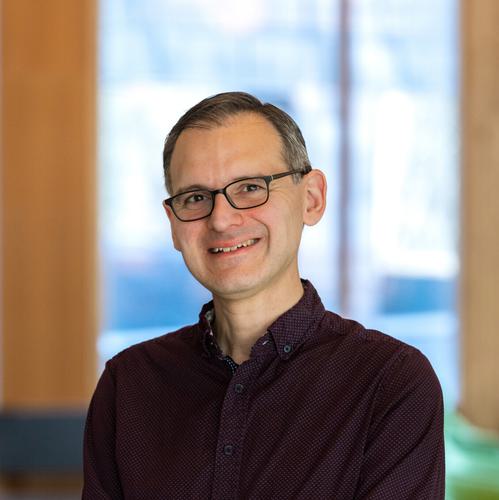
Don Elmore
Denise Kellen '68 Chair in the Health Sciences and Professor of Chemistry
Links
Uses experiments and computation to study membrane proteins; leads pedagogical development and assessment research; teaches biochemistry, introductory chemistry and courses in computational modeling and public writing.
My lab investigates proteins associated with the cell membrane with a focus on protein•lipid interactions. Our primary project concerns histone-derived antimicrobial peptides (HDAPs). While many HDAPs have been isolated from natural sources, relatively little is known about their mode of action on the molecular level. We use molecular dynamics simulations and a variety of experimental methods to investigate the structure-function relationships of these peptides and design novel HDAPs. Much of this work is done in close collaboration with Louise Darling (Biological Sciences), including developing improved methods for visualizing peptide mechanisms using confocal microscopy. I also am involved in collaborations with Mala Radhakrishnan (Chemistry) considering how macromolecular crowding affects the interactions and activity of antimicrobial peptides and using electrostatics calculations to design more active peptides. At Wellesley I have also been involved in projects considering the structure-function relationships of bacterial ion channels, including the discovery of the bacterial cyclic nucleotide gated ion channel family with Joshua Maurer (Benét Laboratories). One of the best parts of my position at Wellesley is the ability to collaborate with talented undergraduates, and since arriving at Wellesley in 2004 I have mentored over 95 research students in my lab. These students have made central contributions to my research, and many of them are co-authors on journal articles. Students from Framingham High School have also worked in my lab through the summer research program. My research work has been funded by external awards from the National Institutes of Health, the National Science Foundation and Research Corporation, and I was selected as a Henry Dreyfus Teacher-Scholar in 2011. I have also been the PI on three funding cycles for the Wellesley College Beckman Scholars Program.
I primarily teach courses in biochemistry and introductory chemistry at Wellesley. In these courses, I place a particular emphasis on fostering student group work and increasing student exposure to research methods and data analysis. One particular interest of mine is incorporating computational modeling methods throughout the curriculum, and I introduced a course in computational chemistry that is now part of the department's regular offerings. An article describing some of the computational activities used in my courses was published in Biochemistry and Molecular Biology Education (BAMBEd). I also coordinated a special section of BAMBED focusing on the use of molecular dynamics and related methods in the classroom in 2016. More recently, I also developed a course, Can Biochemistry Address Societal Problems, for the college's Calderwood Program in Public Writing. It was a great honor to receive the Pinanski Prize in Teaching from the college in 2009.
I have been actively involved in departmental and college governance and leadership, most recently in serving as Chair of Chemistry (19-23) and as chair of the Committee on Admissions and Financial Aid. the COVID Health and Safety Committee and as faculty co-chair of the Laboratory Safety Committee. In recent years, I also have been on the Strategic Planning Steering Committee, the COVID Health and Safety Committee, the Laboratory Safety Committee (faculty co-chair), the Committe for Faculty Appointments, the Faculty Merit Committee, the Faculty Benefits Committee (chair 14-15), the Agenda Committee (co-chair 11-12), and the Trustee Committee for Academic Affairs. I also have served multiple years as the Director of the Biochemistry program. Outside of the college, I am active in the American Society for Biochemistry and Molecular Biology (ASBMB) as a member of the Women in Biochemistry and Molecular Biology (WiBMB) Committee and as a coach for the IMAGE grantwriting program. I currently serve on the Editorial Board of BAMBEd and regularly review journal articles and grant proposals for a variety of domestic and international organizations.
Outside of work, I enjoy spending time with my wife, Julia Prentice, the Research Director for the Betsy Lehman Center for patient safety, and our two wonderful (in my clearly objective opinion) children. I also serve as Vice-President of the Board of Directors for the Dedham Community House, an organization focused on providing educational, recreational and social activities for residents of Dedham and surrounding communities and as Treasurer of the Dedham Arts Boosters. Whenever possible, I love to catch live music, with a particular affinity for jazz, R&B/soul and classical--and a growing appreciation for musicals and contemporary pop music promoted by my kids! Although I still blanch a bit at New England winters, I have come to love hiking and making my feeble attempts at gardening in the beautiful summer and fall.
For more information on my research, please visit the Elmore Lab website.
Education
- B.A., Grinnell College
- Ph.D., California Institute of Technology